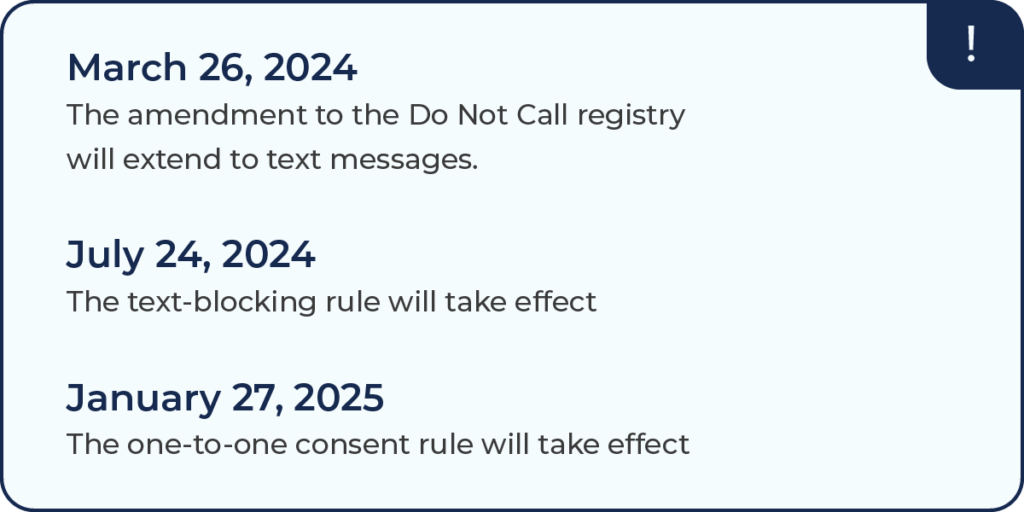Know Your Customer, TCPA Rule Execution & More Regulations You Need to Understand
In our digital-first world, the ways we communicate and conduct business are constantly evolving – and with that evolution comes changing regulations. In the telecom industry, the United Kingdom-based Know Your Customer (KYC) requirements and data privacy measures have recently come under the microscope and seen updates as well.
In the United Kingdom (U.K.), KYC and potential AI-related regulations aim to offer better protections for consumers. Meanwhile, the United States (U.S.) Federal Communications Commission (FCC) is rolling out changes impacting how telecom companies collect and use customer data.
It can feel complicated and time-consuming to closely track these changing regulations. However, leaders who take the time to familiarize themselves with these regulations’ impact on their business (and the telecom industry as a whole) will be better prepared to adapt their business to comply with new guidelines. The savviest organizations will also help their technology partners develop more robust data security practices.
Know Your Customer in the UK
The KYC regulations implemented in the U.K. aim to combat the misuse of services for illegal activities, such as money laundering or fraud. Under these regulations, businesses must verify the identity of their customers (usually during the onboarding process) with valid identification documents, like a government-issued ID.
Recent developments in KYC regulations are designed to strengthen identity verification processes and improve data access for more thorough checks. By September 20204, all existing business customers within the U.K. must provide identity verification documentation.
There are also other important time frames to keep in mind, like:
- May 2024, when an approved regulatory compliance (RC) bundle will be required for any new long code purchases
- September 30, 2024, when all UK long codes (new and existing) must be attached to an approved RC bundle to maintain service.
As a CallTrackingMetrics customer, there are three things you can do to help ensure KYC compliance:
- Provide accurate information during the onboarding process.
- Cooperate promptly with requests for additional information to maintain uninterrupted service.
- Help contribute to a secure and reliable network by developing and maintaining internal KYC processes.
To comply with KYC information requests, you’ll need the following documentation:
- Company name
- Registered number
- Place of registration
- Registered office address
- Contact details
- Details of how to contact the business by non-electronic means
- VAT number of your business, if applicable
- Details of any trade body or regular registration
Other requirements include privacy notices, cookie disclosures, disclaimers, and more.
The most important thing to remember is that these regulations are in place to improve security and enhance protection.
New FCC rules in the U.S.
In the U.S., the FCC is implementing new rules that change consumer consent practices. These new regulations will require that, rather than allowing a single consumer consent to opt-in to communications from multiple marketing partners at once, they must opt in for robocalls/texts through each partner individually with express written consent. This closes the “lead generation loophole” and will give the FCC greater control over the enforcement of several policies including:
- Communication Act
- Telephone Consumer Protection Act (TCPA)
- Robocall Mitigation Database (RMD)
- Pallone-Thune Telephone Robocall Abuse Criminal Enforcement and Deterrence Act (TRACED Act).
The bottom line: One-to-one consent for marketing communications is now imperative in the U.S. As a result, expect to see updates and changes to the following:
- The Do Not Contact (DNC) list will expand to texts, not just calls
- One-to-one consent must be obtained before marketers can send robocalls/texts to consumers. A single consent is no longer applicable to multiple marketing partners.
- Clear and Conspicuous Disclosure that the consumer will receive robocalls/texts from the specific marketing partner must precede the necessary one-to-one consent. The disclosure must be “apparent to a reasonable customer.”
- Logically and Topically Related Consumer Content sent via robocalls and texts must be connected logically to whatever prompted the consumer to grant consent. The FCC did not specify the exact scope of permitted content, so sellers should err on the side of caution and only serve consumers content that they would expect to be associated with their initial consent.
- Proof of Valid Consent becomes easier for the company making the calls/texts to demonstrate because they have a direct record of the consumer’s consent rather than a record from a third party by requiring explicit consent directly from the consumer to a specific company (one caller/texter at a time).
These new rules clarifying consent practices should reduce unwanted robocalls/texts since each company trying to connect with a consumer has to get explicit permission to reach out.
Regulation Dates to Remember

Here are some more important dates to remember:
- March 26, 2024 — the amendment to the Do Not Call registry will extend to text messages.
- July 24, 2024 — the text-blocking rule will take effect
- January 27, 2025 — the one-to-one consent rule will take effect
Though rules and regulations are always changing, staying on top of updates can help your business remains compliant and prevent costly fines for not meeting established regulatory expectations. Agile, adaptable businesses will drive long-term success.
Need help with your marketing strategies in the wake of these regulations?
Contact CallTrackingMetrics to learn more about how we make it simple for our customers to stay compliant and secure no matter where they’re located.